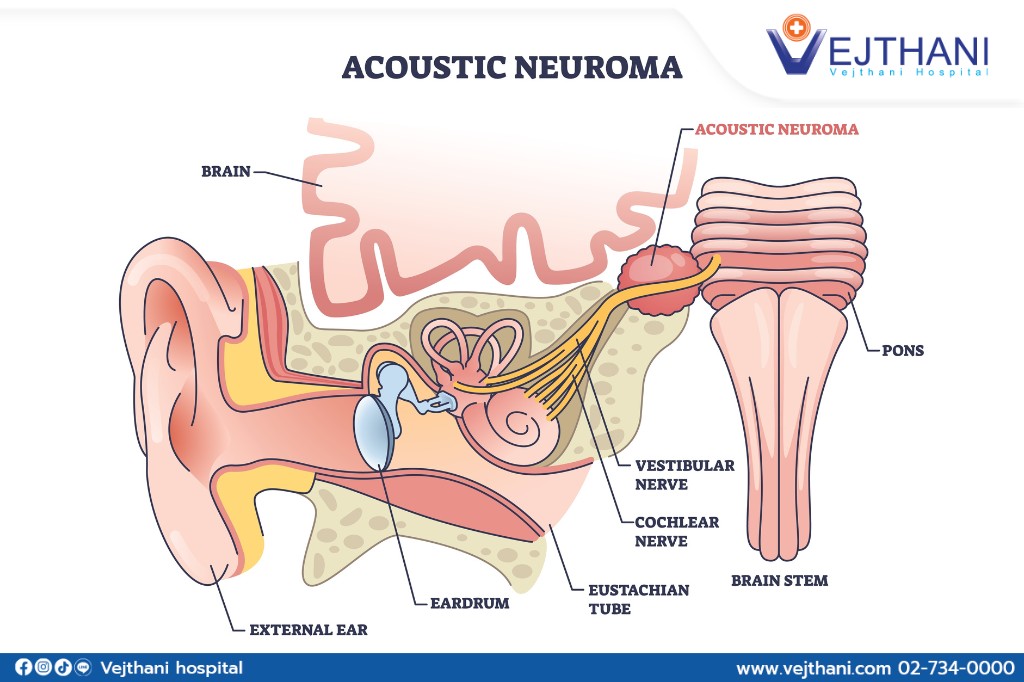
Acoustic neuroma


Overview
The major nerve (vestibular) that connects your inner ear to your brain might develop a noncancerous growth called an acoustic neuroma, also known as a vestibular schwannoma. Branches of this nerve directly affect your balance and hearing. The pressure from an acoustic neuroma can cause hearing loss, ringing in the ears, and loss of balance.
Acoustic neuromas commonly developed from the Schwann cells, which often grow slowly or not at all. Occasionally, it may develop quickly and grow big enough to press up against the brain and vital structures.
Regular monitoring, radiation therapy, and surgical removal are among options for treating acoustic neuromas.
Around 50% of patients with small to medium tumors who had healthy hearing prior to surgery still do so thereafter. Hearing loss can be helped by hearing aids.
Symptoms
Acoustic neuroma signs and symptoms can take years to manifest and are sometimes simple to miss. These typically occur as a result of the tumor’s impact on the nerves that control hearing and balance. Problems could also arise from pressure from the tumor on surrounding nerves regulating facial muscles and sensation (such as the trigeminal and facial nerves), nearby blood vessels, or brain structures.
The signs and symptoms may become more obvious or severe as the tumor enlarges.
The following are typical auditory neuroma symptoms and signs:
- Hearing impairment typically progresses gradually over a period of months to years, but in rare instances, it may occur suddenly. It can affect one ear or be more pronounced in one ear compared to the other.
- Imbalance or unsteadiness
- Dizziness or vertigo
- Tinnitus, or ringing, in the impacted ear
- Vomiting and nausea
- Headaches
- Problem swallowing
- Changes in taste
- Numbness in the face, as well as muscle weakness or lack of mobility
Rarely, an auditory neuroma may enlarge to the point where it compresses the brainstem and poses a life-threatening threat.
If you experience balance issues, ringing in your ears, or hearing loss in one ear, consult a doctor.
An acoustic neuroma may be prevented from becoming large enough to have catastrophic effects, such as total hearing loss, with early detection.
Causes
An issue with a gene on chromosome 22 may be the root of auditory neuromas. Usually, this gene creates a tumor suppressor protein that aids in regulating the expansion of Schwann cells, which cover the nerves.
Scientists are unsure of what is causing this gene-related issue. There is no known cause for the majority of acoustic neuroma instances. This defective gene is also inherited in neurofibromatosis type 2, a rare condition that often manifests as tumor growth on both sides of the head’s hearing and balance nerves (bilateral vestibular schwannomas).
Risk factors
Neurofibromatosis type 2
Having a parent with the rare genetic condition neurofibromatosis type 2 is the sole known risk factor for auditory neuroma. However, only about 5% of instances of auditory neuroma are caused by neurofibromatosis type 2.
The growth of noncancerous tumors on the hearing and balance nerves on both sides of the head, as well as on the other nerves, is a defining feature of neurofibromatosis type 2.
Autosomal dominant disorders, such as Neurofibromatosis type 2 (NF2), allow the mutation to be passed down from just one parent (dominant gene). There is a 50/50 probability that each child of a parent who is affected will inherit it.























